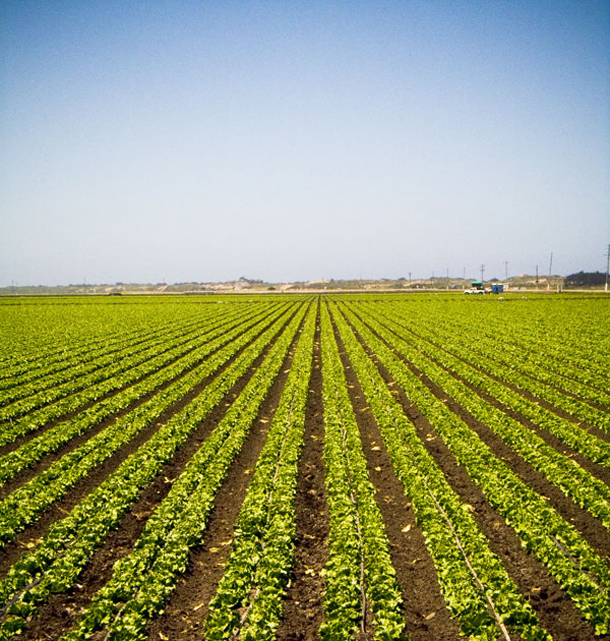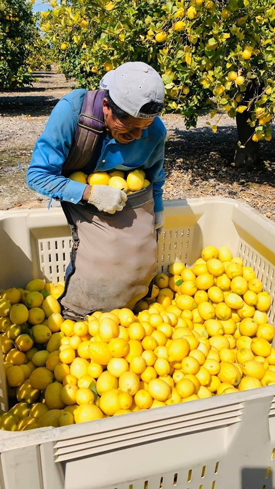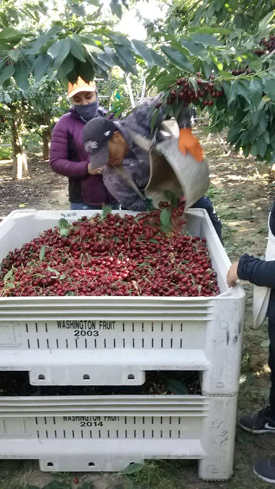A Migrant Farmworker Shares COVID-19 Fears
Air Date: Week of May 1, 2020

The California agricultural industry accounts for more than 13% of the United States' agricultural value. (Photo: Liji Jinaraj, Flickr, CC BY SA 2.0)
Farmworkers must continue to work in close quarters with others, but some are provided with only soap and water to shield against COVID-19. And if they get sick, many don’t have any health insurance. From Mexico Living on Earth’s Paloma Beltran reports what she learned from speaking with a longtime Mexican farmworker in California about his fears and frustrations about working in the midst of the
Transcript
BASCOMB: For more, I’m joined by Living on Earth’s Paloma Beltran. Paloma is in Mexico now, riding out the pandemic with her family and has been digging into this story of the Coronavirus and agricultural workers.
Hi Paloma, how are you?
PALOMA: Hi Bobby, I’m good, happy to be safely isolating with my mom and sister. How about you?
BASCOMB: Good, lots of time with my husband and kids.
PALOMA: Nice…
BASCOMB: So, you recently spoke with a farmworker who is struggling through the pandemic. Tell me about him, please.
PALOMA: Right, I talked with a man named Jesus. He is originally from central Mexico but has been an agricultural worker in California for almost 20 years. He makes $13 an hour before taxes at a non-union farm and is just about to start the cherry-picking season then he’ll move to grapes in June. But of course, that’s only if there is enough demand for those products. Already his hours have been cut from 10 hours a day to 8. And he’s really worried about the economy and hopes that it opens up soon.
JESUS: “Si nosotros no trabajamos no comemos."

The San Joaquin Valley citrus region has more than 20,000 lemon harvesters. There are more than 700,000 agricultural workers in California, all of whom are considered essential workers during the coronavirus pandemic. (Photo: Courtesy of UFW)
PALOMA: He says, “If we don’t work we don’t eat.” And Jesus is not just worried for himself. He sends money back to his wife and kids In Mexico each month and that’s their main source of income.
JESUS: “Espero dios y no me enferme y pues yo necesito trabajar para poder mantener a mi familia”
PALOMA: He says, “I hope God spares me from getting sick because I need to work to provide for my family.” He’s really scared.
BASCOMB: Wow, that sounds so stressful. What is he doing to keep himself safe and avoid getting the virus?
PALOMA: Well, I was shocked to hear Jesus say that his employers aren’t providing anything other than soap and water to help him and his co-workers stay safe.
JESUS: “Nosotros de nuestra propia cuenta tenemos que llevarnos pañuelos para protegernos y cuidarnos nosotros mismos”
PALOMA: He’s saying, “we have to buy our own facemasks or wear scarves to protect ourselves and we wash our hands as much as possible.” Some employers are “encouraging” social distancing but it's really hard to distance yourself when you are working in the agriculture industry. It’s a hands-on job that requires teamwork and face to face interaction.
JESUS: “Nosotros trabajamos en cuadrillas de 15-20-25 personas pues si tenemos miedo a enfermarnos. Si nosotros nos enfermamos no tenemos con qué pagar lo que es el seguro médico."

The San Joaquin Valley is the largest cherry production region of California. Most of the United States’ vegetables, fruits, and nuts are grown in California, making California agricultural workers an integral part of the nation's food supply. (Photo: Courtesy of UFW)
PALOMA: He says, “we work tight groups of 15-20-25 people and everyone works closely together, so everyone is scared of getting sick. We don’t have health insurance, if we get sick we would have to pay health care costs out of pocket from the little savings we have.” And I think he feels a bit of resentment about the lack of support. He says the United States is highly dependent on immigrant farm workers like him and he contributes to the economy.
JESUS: “Nosotros también en nuestro cheque nos descuentan lo que es seguro, lo que es médical, todo lo federal también. Osea nos descuentan igual que una persona que tiene documentos ”
PALOMA: Farmworkers pay taxes just like everyone else, he says, including federal taxes and so he doesn’t understand why the federal government is not supporting them as essential workers during this pandemic.
BASCOMB: Jesus is just one person but it sounds like his story is pretty common across the industry.
PALOMA: Yes, for sure. Jesus says he’s also worried for people who work in managerial roles and packing facilities across the commodity chain. And as we’ve mentioned earlier more than half of the fieldworkers in the US are like Jesus and undocumented so they face very similar challenges. Jesus told me that he talks a lot with his co-workers about the virus and fear of getting sick and losing their jobs. And they’re just feeling sad, you know, the missing family that’s so far away.
BOBBY: Right, such a difficult position to be in. Well, thanks for bringing us his story, Paloma.
PALOMA: You’re welcome. Stay safe there.
BOBBY: You too! I’ll talk to you soon. That’s Living on Earth’s Paloma Beltran from her home in Mexicali, Mexico.
Links
Los Angeles Times | Farmworkers face coronavirus risk: ‘You can’t pick strawberries over Zoom’
National Geographic | Farmworkers Risk Coronavirus Infection to Keep U.S. Fed
Living on Earth wants to hear from you!
Living on Earth
62 Calef Highway, Suite 212
Lee, NH 03861
Telephone: 617-287-4121
E-mail: comments@loe.org
Newsletter [Click here]
Donate to Living on Earth!
Living on Earth is an independent media program and relies entirely on contributions from listeners and institutions supporting public service. Please donate now to preserve an independent environmental voice.
NewsletterLiving on Earth offers a weekly delivery of the show's rundown to your mailbox. Sign up for our newsletter today!
 Sailors For The Sea: Be the change you want to sea.
Sailors For The Sea: Be the change you want to sea.
 The Grantham Foundation for the Protection of the Environment: Committed to protecting and improving the health of the global environment.
The Grantham Foundation for the Protection of the Environment: Committed to protecting and improving the health of the global environment.
 Contribute to Living on Earth and receive, as our gift to you, an archival print of one of Mark Seth Lender's extraordinary wildlife photographs. Follow the link to see Mark's current collection of photographs.
Contribute to Living on Earth and receive, as our gift to you, an archival print of one of Mark Seth Lender's extraordinary wildlife photographs. Follow the link to see Mark's current collection of photographs.
 Buy a signed copy of Mark Seth Lender's book Smeagull the Seagull & support Living on Earth
Buy a signed copy of Mark Seth Lender's book Smeagull the Seagull & support Living on Earth

